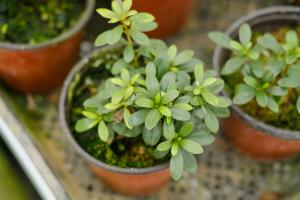Can You Plant a Bonsai Tree in the Ground?
Bonsai trees are captivating and elegant plants that can add an element of beauty and tranquility to any home or garden. However, many people wonder if they can plant a bonsai tree in the ground, especially if they live in an area where the climate is conducive to growing such trees. The answer to this question is yes, but there are a few important factors to consider before planting a bonsai tree in the ground.
Soil Requirements
The first consideration when planting a bonsai tree in the ground is the soil. Bonsai trees require soil that is well-draining, rich in nutrients, and is slightly acidic. If your soil does not meet these requirements, you will need to amend it or choose a different planting site. Bonsai trees are also sensitive to root rot, so be sure to avoid areas with standing water, heavy clay soils or compacted soils.
Climate Conditions
Another important factor to consider is the climate conditions in your area. Bonsai trees are native to specific regions in Asia, and each species has its own specific climate requirements. Some bonsai trees prefer cooler temperatures, while others prefer warmer and more humid conditions. Before planting a bonsai tree in the ground, be sure to research the specific needs of the tree you want to plant, and ensure your climate matches those requirements.
Site Selection
The location where you plant the bonsai tree is also critical to its growth and survival. Ideally, the planting site should be in full sun or partial shade, depending on the needs of the specific tree. The site should also be well-draining and protected from harsh winds. The area should also be free from weeds or other competing plants that can steal nutrients from the bonsai tree.
Planting Technique
The planting technique you use for a bonsai tree is also different from that of a regular tree. To plant a bonsai tree in the ground, you need to dig a hole that is at least twice as wide as the root ball, but only as deep as the root ball. Once you have placed the tree in the hole, fill it with soil and tamp down gently to remove any air pockets. After planting, you should water the tree thoroughly to help it establish in its new location.
Maintenance
Finally, it is important to note that while bonsai trees can be planted in the ground, they still require special care and maintenance to thrive. This includes regular watering, fertilizing, pruning, and pest control. Bonsai trees may also need to be repotted every few years to prevent the roots from becoming too crowded.
Conclusion
In conclusion, yes, you can plant a bonsai tree in the ground, but it is important to consider the specific needs of the tree, the climate conditions in your area, and the planting and maintenance techniques required to ensure its growth and survival. By following these guidelines, you can enjoy the beauty and tranquility of a healthy and thriving bonsai tree in your own backyard.

 how many times do yo...
how many times do yo... how many planted tre...
how many planted tre... how many pine trees ...
how many pine trees ... how many pecan trees...
how many pecan trees... how many plants comp...
how many plants comp... how many plants can ...
how many plants can ... how many plants and ...
how many plants and ... how many pepper plan...
how many pepper plan...































